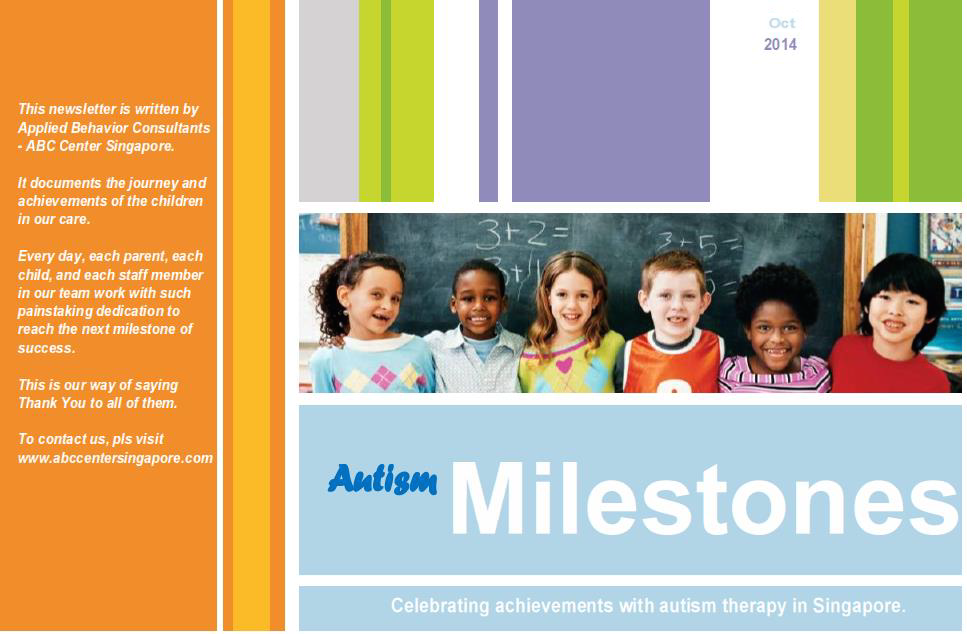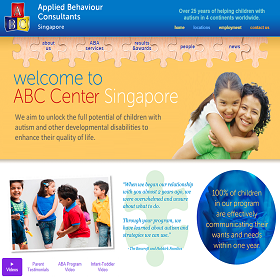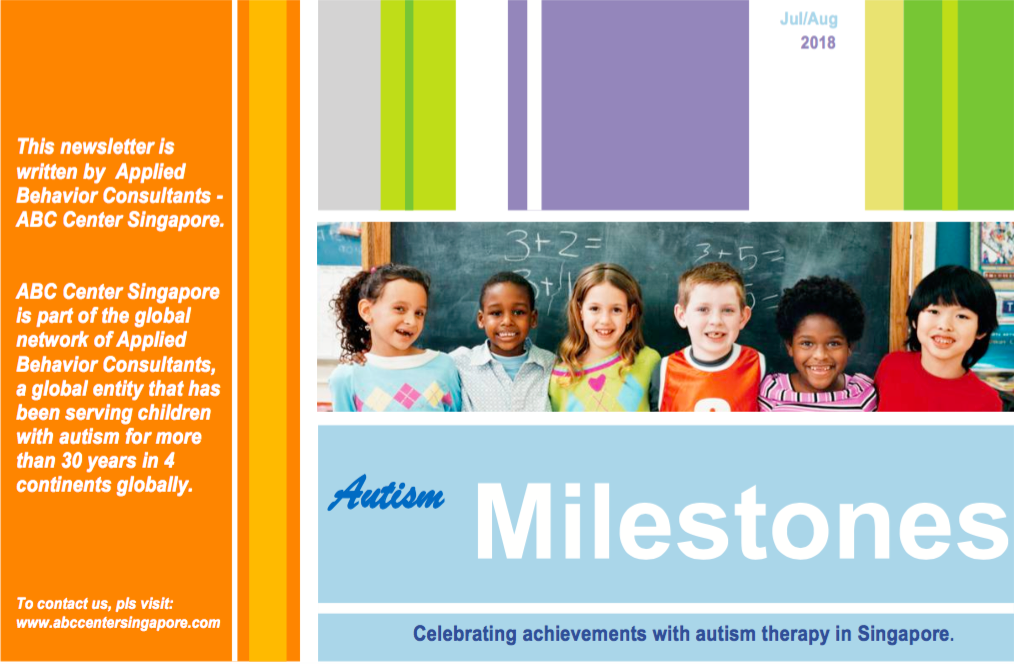
When Allan* was two years old, he was diagnosed with autism. His parents enrolled him in a special education school, but soon realized he was higher functioning than his peers. Hence, they tried to have Allan go for mainstream school. We speak to Mr. B, Allan’s dad, and Ms. Hui Ling Loh, MA, BCBA, Clinical Director at ABC Center Singapore, about Allan’s journey.
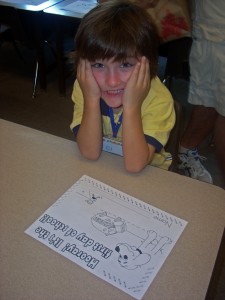 How did you know that Allan has autism?
How did you know that Allan has autism?
Mr. B: It was my wife who initially observed that he wasn’t reaching the typical milestones he should have been hitting, such as pointing, saying his or our names, saying yes or no, and following very simple instructions such as ‘sit down’ or ‘stand up’.
He was also very fond of spinning around and around and was obsessed with numbers. My wife took some indication tests online and found that he had markers for autism.
I was skeptical at first, but I was finally convinced when I observed him in school during his own 2nd birthday party. He spent the whole session spinning, jumping around and lying down on the floor. He would not sit down to eat. His teachers shared with us how they found him difficult to control and encouraged us to have him diagnosed.
How old was he when he was diagnosed?
Mr B: Allan was 2 years old.
Did you have Allan go through different forms of therapy?
Mr. B: Allan first enrolled in occupational and speech therapy, and went to a nursery that specialized in kids with special needs. This continued for about a year. Although we saw a lot of improvement, we realized that Allan was higher functioning than his peers.
And this made you decide to try a mainstream school?
Mr. B: Yes, we felt that we were ready to take the leap to a mainstream school. However, we still had many doubts about his school readiness. That was when we felt ABC Center Singapore could step in. We cancelled the 3 separate treatments (OT, ST, nursery) and replaced it with ABC Center therapy and his mainstream school.
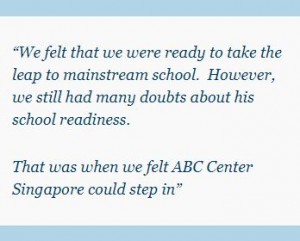 So, Allan went to a mainstream kindergarten, and ABC Center therapy at the same time. How did you manage to fit that in Allan’s schedule?
So, Allan went to a mainstream kindergarten, and ABC Center therapy at the same time. How did you manage to fit that in Allan’s schedule?
Mr. B: Somehow we made it fit. His mainstream kindergarten was everyday Monday to Friday, ending in the early afternoon. Then twice a week, we would rush right after school to ABC Center so he could attend ABC Center therapy.
(Speaking to Ms HuiLing Loh, Clinical Director at ABC Center Singapore)
As the Clinical Supervisor at ABC Center working with Allan, how did you plan his therapy when he first joined?
Ms. HuiLing Loh: We started off with a skill assessment to help us better understand his strengths and deficits. We have also spoken to parents regarding the concerns they have for him and their goals for Allan. Taking into consideration all of the above, we crafted a program individualized to his needs.
How did your program at ABC Center help Allan?
Ms HuiLing Loh: At ABC Center, we focus on Applied Behavior Analysis (ABA) intervention for the children in our care. While many people think that ABA is only for lower-functioning children, that is actually not true. ABA, if applied well, can be used successfully for children who are high-functioning as well. At ABC, we are fortunate to have Board Certified Behavior Analysts (BCBA’s) who have the expertise to do this. The key is to properly plan the lessons to focus on the most critical, and also to generalize the skills quickly so that they are utilized by the child in his daily environment.
What do you mean by ‘generalize the skills quickly’?
Ms HuiLing Loh: What I mean is, whatever skills we teach the child at therapy session, we want the skills to be used in other environments and with other people. In Allan’s case, this means all the skills he learned in therapy session at ABC are being used at school and home, with his peers, teachers, siblings and parents. At ABC Center, we are proud of our generalization program, designed by our co-founder Ms. Brenda Terzich-Garland. We systematically teach generalization and design it to be part of our program. If fact, ABC’s clinical work in this area has been cited in the Behavior Analysis textbook ‘Behavior Analysis and Learning’ (Epling and Pierce, 1995 2nd and 3rd Edition, Pierce and Cheney 2013 4th and 5th Edition).
You were aware that Allan’s parents wanted to keep him in mainstream school. Were you supportive of it? Did you guarantee that Allan would be successful?
Ms HuiLing Loh: Yes I was supportive of him being in mainstream school. However, there were never any guarantees. All we can do is keep the parents’ concerns and the child’s goals in mind while working with the child to the best of our abilities, and try to make his progress go as much as possible. It is good to see that this has worked for Allan to successfully stay in the mainstream school environment.
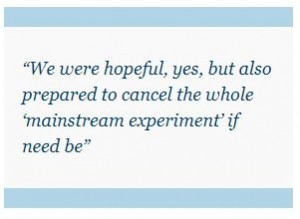 (Speaking to Mr B., Allan’s father)
(Speaking to Mr B., Allan’s father)
As a father, how did you feel when you first joined ABC Center? Were you hopeful that it would enable Allan to stay in a mainstream school?
Mr. B: We were hopeful, yes, but also prepared to cancel the whole “mainstream experiment” if need be.
Why did you choose ABC Center?
Mr. B: We liked how their approach was “all-in-one”. We liked how there were more quantitative measures and structures in place when assessing the performance of the child. We liked how the even if the therapy was conducted on a one-on-one basis, the child moves from teacher to teacher to be able to generalize his learning.
Can you recall examples of skills that Allan could not do before, but now he is able to?
Mr B: He can now ask for what he wants. This is very important and we are happy he learned this. He also now acts with more spontaneity and is more at ease in a social context. His social skills have greatly improved, such as taking turns and following established rules.
 How about his performance in his mainstream school?
How about his performance in his mainstream school?
Mr B: Yes, we have seen improvement in this as well. He is able to finish more complicated tasks on his own. This makes him more effective in school.
Also, Allan has learned not to hit things when he feels frustrated. This has enabled him to be accepted by his teachers in the mainstream school environment.
What did you do to celebrate his learning achievements?
Mr B: Nothing really. But since his capabilities increased, our relationship with him is a lot more enriched and we enjoy each other a lot more…so maybe this was the positive reinforcement that kept encouraging us and him to keep at it.
Beyond the learning plan for Allan, did you get advice from ABC Center on what you can do to help him? Were they helpful?
Mr. B: There was this parent training on Positive Parenting that showed us a new approach in teaching him to do more complicated tasks.
Is there anything you want to say to the staff at ABC Center?
Mr B: For all those involved in this journey with us, thank you from the bottom of our hearts. We are continuously amazed at the creativity, effort and love that is poured into the activities for our child. We know that he is an amazing, loving person and now he is developing the skills to share this with the world.
ABC CENTER SINGAPORE is part of the global network of Applied Behavior Consultants – a global entity that has been serving children with autism for over 25 years in 4 continents worldwide. Our early intervention services include 1 on 1 ABA therapy, as well as our EarlyPreps group preschool program.
Our EarlyPreps group preschool is the only ABA-based program within the Singapore MSF PPIP program where Singaporean/PR children who meet requirements may apply for financial subsidy.
To contact ABC Center (Applied Behavior Consultants) Singapore, please see www.abccentersingapore.com or call (65) 94236248
BACK TO ABC CENTER SINGAPORE HOMEPAGE

*All children and parents’ names and photos are changed for confidentiality purposes.

